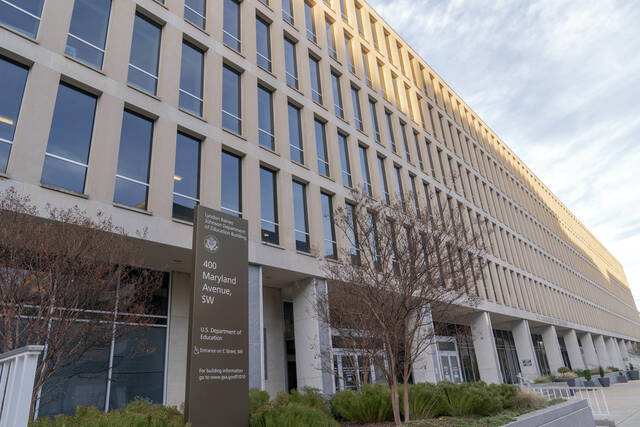Western Pa. school leaders uncertain how Education Department cuts will affect them
Leaders of Western Pennsylvania school districts reacted Wednesday to the sweeping job cuts announced at the U.S. Department of Education with uncertainty, saying they did not yet know how the cuts might affect their programs or budgets.
While Trump administration officials have said the latest job cuts won’t affect federal funding to K-12 schools, it remains unclear how much further the administration will go to downsize the Education Department and what impact that might have on districts’ bottom lines.
Pennsylvania school districts must pass their budgets for the coming school year by the end of June.
“The current fluidity of the situation has caused significant concern, and many questions are being directed to leaders” at the Pennsylvania Department of Education and the Pennsylvania Association of School Administrators, said Jeannette Superintendent Matt Jones.
“Unfortunately,” Jones added, “there really are not many answers to those questions. And in the days ahead, we will all be looking for clarity.”
The federal Education Department on Tuesday announced plans to lay off over 1,300 of its more than 4,000 employees as part of a reorganization that’s seen as a prelude to President Donald Trump’s plan to dismantle the agency.
The Trump administration already had been whittling the agency’s staff, through buyout offers and the termination of probationary employees. After the layoffs, the Education Department’s staff will sit at roughly half of its previous 4,000, according to Rachel Oglesby, the department’s chief of staff.
In addition to the layoffs, the Education Department is terminating leases on buildings in cities including New York, Boston, Chicago and Cleveland, Oglesby said. She said the changes would not affect the agency’s Office for Civil Rights or its functions mandated by Congress, such as the distribution of federal aid to schools.
‘Do we have a plan?’
Despite the latter assurance, some school leaders in Western Pennsylvania expressed concern that funding cuts could come with further efforts to downsize the agency.
“Heading into the new budget year, we are cautiously applying the funding totals we have received in the past but fully understand that may require a shift if that allocation is reduced,” Jones said.
Jeannette is receiving about $960,000 in federal funding this school year, according to the district. Thatamounts to about 4% of the district’s $23.7 million operating budget.
Jones said federal money has been used “to support the salary and benefits of key support in our district.” If that funding were reduced, he said, the district would “be strapped to find alternate funding sources for these vital positions.”
In an interview this week on WILK Radio in Wilkes-Barre, Pennsylvania Gov. Josh Shapiro explained that federal education funding is largely directed to support low-income children and children with disabilities from families in a range of income brackets. It also helps to reduce class sizes and provide Pell grants to college students, according to PennLive.
“If they roll back that mission, that will crush schools,” Shapiro said, as reported by PennLive.
At the same time, Shapiro urged people not to overreact. “Let’s try to find out who’s laid off and what they do,” he said.
Plum school officials at a budget meeting Tuesday discussed the potential impact of Education Department cuts.
The district has been expecting to receive about $1 million in federal funding in the coming school year, according to Ryan Manzer, the district’s business manager. The district is operating on a $74.3 million budget this school year, according to information on its website.
The potential loss of federal money could force districts like Plum to choose between raising taxes or dipping into reserve funds to make up the difference or abandoning or scaling back certain programs.
“I don’t want to increase taxes for what might happen,” board President Angela Anderson said. “But if it would happen, do we have a plan?”
Superintendent Rick Walsh said he is mindful of it. He said Plum’s federal funding helps pay for six teachers that provide reading support services.
‘Potential positives, negatives’
Pittsburgh Public Schools, Western Pennsylvania’s largest school district, receives about $56.7 million in federal funding, equivalent to about 7.5% of its $752.3 million operating budget, according to spokeswoman Ebony Pugh.
“We’re trying to understand what’s going on,” Pugh said of the changes at the Education Department. “It’s hard to know for sure what the impact will be, because we don’t have enough information.”
Likewise, Burrell Superintendent Shannon Wagner said there are many questions about what the future holds. She said the district receives about $230,000 from the federal government, less than 1% of its budget.
“At Burrell, we do the very best we can with everything we’re given to every child that walks through our doors,” she said.
Hempfield Area Superintendent Mark Holtzman said he had mixed feelings about the planned cuts.
“I think there’s potential positives and some potential negatives,” he said.
While Holtzman would like to see changes made to testing standards — which require schools to complete state tests to receive federal funding — he is concerned about how federal funding would be distributed to school districts without the Department of Education.
“If the funding continues to be distributed (but) in a different way … that could be OK,” he said. “I think we can see some positivity if in fact the testing component (changes).”
Hempfield Area receives about $1 million in federal funds each year, Holtzman said. Its operating budget amounts to $109.6 million this year, according to the district’s website.
Norwin Superintendent Natalie McCracken declined to comment on the planned cuts, saying she did not have enough information. Norwin School Board member Alex Detschelt said he welcomed them.
“I look forward to the DOE being shut down, even if it will take years to undo the damage they have caused,” said Detschelt, a staunch Trump supporter.
Detschelt said he felt the Education Department has been “holding schools hostage to leftist agendas” by not keeping things such as DEI (diversity, equity and inclusion), critical race theory and gender ideology out of classrooms.
“The Education Department is wasteful and detrimental government oversight,” Detschelt said.
Yough School Board President Jared Filapose said eliminating the Education Department doesn’t matter much to him — as long as the district continues to receive the same funding from the federal government.
“Having more bureaucracy in Washington is wasteful, especially when our district knows what we need for our students,” Filapose said, noting he was speaking for himself and not the entire school board.
Yough Superintendent Anthony DeMaro said he believes the Education Department has “played a crucial role in ensuring consistency in educational standards and providing critical funding and resources to schools across the nation.” Yough anticipated receiving a little more than $760,000 in federal funding this year, equivalent to about 2% of its $37.2 million operating budget, according to the district’s website.
“The potential elimination of this department as a whole raises some concerns about the future of public education, particularly in terms of equitable support for underserved communities and the continuity of programs such as Title I funding and special education services,” DeMaro said.
But “without knowing particulars” about the planned cuts at the Education Department, DeMaro said it’s impossible to know how his district will be affected.
“Convert this initiative into dollars and I would be better served to respond to the impact it would have on our local schools,” he said.
The Associated Press and TribLive staff writers Quincey Reese, Brian Rittmeyer and Kellen Stepler contributed to this report.
Remove the ads from your TribLIVE reading experience but still support the journalists who create the content with TribLIVE Ad-Free.



